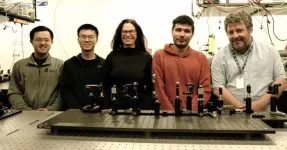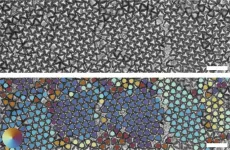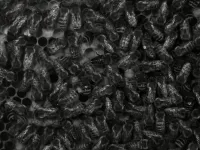(Press-News.org) Investigators from the UCLA Health Jonsson Comprehensive Cancer Center will discuss the latest breakthroughs and cutting-edge science at the annual meeting of the American Association for Cancer Research (AACR), which attracts more than 20,000 oncology professionals from around the world.
The annual meeting will feature more than 40 regular, late-breaking and clinical trial abstracts from UCLA physicians and scientists, who will present their latest work in key areas of translational and basic scientific research, including new compounds and drug targets, combination immunotherapy approaches, updated organoid models, survivorship research and more.
Dr. Deborah Wong, assistant clinical professor of medicine at the David Geffen School of Medicine at UCLA, will present findings from the IMvoke010 clinical trial (abstract CT009), which is a double-blinded randomized trial of atezolizumab after definitive local therapy vs placebo in patients with high-risk locally advanced squamous cell carcinoma of the head and neck. The results will be highlighted during the during the Clinical Trial Plenary Session on April 7 from 3:30 to 5:30pm PT in Hall GH.
Dr. Zev Wainberg, professor of medicine at the David Geffen School of Medicine at UCLA and co-director of the UCLA Health GI Oncology Program, will share results from of a pilot study looking at neoadjuvant modified FOLFIRINOX plus nivolumab in borderline resectable pancreas cancer (abstract CT031). The findings will be presented during the Clinical Trials Minisymposium on April 8 from 2:30 to 4:30pm PT in Hall GH.
Additionally, Dr. Owen Witte, the founding director emeritus of the UCLA Broad Stem Cell Research Center, is being recognized with the 2024 AACR Award for Outstanding Achievement in Blood Cancer Research. Witte is being recognized for his unprecedented contributions to elucidating the role of tyrosine kinases in hematologic malignancies and for his pivotal role in developing novel cancer treatments. Witte’s award lecture will be held on Tuesday, April 9, at 4:30pm PT.
Highlights of noteworthy presentations at AACR that are led by UCLA researchers include:
Abstract 6574: UCHL1 is a molecular indicator and a therapeutic target for neuroendocrine carcinomas
A team of researchers led by Dr. Tanya Stoyanova, associate professor of molecular and medical pharmacology and urology at the David Geffen School of Medicine at UCLA, identified a protein called UCHL1 as a potential biomarker and therapeutic target for aggressive neuroendocrine carcinomas and a childhood cancer, neuroblastoma. Neuroendocrine carcinomas include neuroendocrine prostate cancer and small cell lung cancer. In the study, the team found that UCHL1 levels are significantly higher in tissues from patients with these neuroendocrine cancers and neuroblastoma. When UCHL1 is reduced or inhibited with small molecule inhibitors, the tumor growth and metastasis of these cancers decrease. The team also demonstrated that UCHL1 has a dual role in promoting cancer progression. It maintains the neuroendocrine characteristics of the tumor and influences the regulation of specific proteins involved in cancer growth. UCHL1 stabilizes a protein called POM121, which affects the transport of key transcriptional factors within the cancer cells. Additionally, UCHL1 binds to and degrades another important protein, p53, known to suppress tumor growth. This work suggests that UCHL1 may represent a common target for drug development in neuroendocrine cancers and neuroblastoma based on its higher expression in these tumors compared to non-neuroendocrine tissues, and also be used a potential molecular indicator for diagnosis and monitoring treatment responses in neuroendocrine carcinomas and neuroblastoma.
Stoyanova will present the findings during the Molecular, Preclinical, and Clinical Endocrinology 3 Minisymposium Session on Tuesday, April 9 from 2:30 to 4:30pm PT in room 5.
Abstract 6550: Biopsy analysis of trial S1616: Ipilimumab plus nivolumab versus ipilimumab alone in patients with anti-PD-1 refractory melanoma
To better understand the effectiveness of the combination treatment of two immunotherapy drugs— ipilimumab and nivolumab— for treating patients with melanoma, UCLA researchers analyzed biopsies taken from patients before and during treatment to understand the molecular and spatial characteristics of the tumors. The team found patients whose cancer responded well to the combination therapy had specific genetic and immune features at the start, including increased expression of genes related to various biological processes. Biopsies from these patients also showed changes indicative of tumor regression, such as reduced gene expression of certain pathways and increased infiltration of active immune cells. In contrast, for patients whose cancer did not respond to the treatment, the biopsies showed persistent exhausted immune cells and specific immune cell populations associated with tumor progression. This suggests that the addition of ipilimumab to the treatment helped some patients by promoting tumor-reactive immune cell infiltration and reducing suppressor cell activity, resulting in tumor regression with distinct genetic features. However, patients whose tumors progressed on the combination therapy lacked these positive changes and exhibited different immune dynamics.
Katie Campbell, adjunct assistant professor in the department of medicine at the David Geffen School of Medicine at UCLA, will present the findings during the Immuno-oncology Minisymposium Session on Tuesday, April 9 from 3 to 5pm PT in ballroom 20 CD.
Abstract 1220: Deep mutational scanning of EGFR reveals potential domain-specific TKI sensitivities in lung cancer and glioblastoma
New research led by Tikvah Hayes, assistant professor of molecular and medical pharmacology at the David Geffen School of Medicine at UCLA, identified new functional mutations in epidermal growth factor receptor (EGFR), a protein often found mutated in lung cancer and glioblastoma, highlighting the potential of EGFR inhibition as a treatment for cancers with specific mutations in the extracellular domain. To better understand the effects of different mutations in EGFR and how these mutations impact the response to drugs targeting EGFR, the team performed a comprehensive mutational analysis of EGFR function. The team created various mutations in EGFR and tested around 22,500 different variants in lung cancer cells dependent on EGFR. The results showed that certain mutations, especially in specific regions of EGFR, made the cancer cells less responsive to erlotinib, a first-generation EGFR inhibitor. They also found some variants in the extracellular domain of EGFR, for which there are currently no approved targeted therapies, responded well to another EGFR inhibitor called dacomitinib. The researchers also observed that a couple of glioblastoma patients with a particular mutation in the dimerization domain of EGFR had stable disease after dacomitinib treatment.
Hayes will present the findings during the Biological Therapeutic Agents Minisymposium Session on Sunday, April 7 from 3 to 5pm PT in room 15.
END
AACR: Progress treating pancreatic cancer, immunotherapy for head and neck cancers, potential biomarker for aggressive neuroendocrine carcinomas and more
UCLA investigators present the latest cancer research at the American Association for Cancer Research annual meeting April 5 to 10 in San Diego
2024-03-25
ELSE PRESS RELEASES FROM THIS DATE:
Insights from patient who cleared hepatitis C could lead to vaccine
2024-03-25
ITHACA, N.Y. -- By studying individuals who spontaneously clear hepatitis C infections, a team of researchers has identified viable vaccine targets for a disease that infects 70 million worldwide with case numbers increasing every year.
It turns out that a quarter of people who become infected with the hepatitis C virus clear the infection on their own without treatment, while the remaining three-quarters of people develop chronic infections that can last for years. The blood-borne disease – which causes liver cirrhosis, liver ...
Uncovering the mystery of Dorset’s Cerne Giant
2024-03-25
For centuries, the Cerne Giant, a figure carved into a hillside in Dorset depicting a nude man carrying a club and stretching some 180 feet high, has fascinated locals and visitors to the area. The history of the giant, however, and in particular, its age, has long been a mystery. A new paper in Speculum: A Journal of Medieval Studies proposes that the Cerne Giant can in fact be dated to the early Middle Ages, and, as a result, its cultural context and significance more clearly understood.
“The Cerne Giant in its Early Medieval Context,” by authors Thomas Morcom and Helen Gittos, acknowledges that previous attempts to date the giant placed ...
RCSI research identifies promising drug combination for multiple myeloma treatment
2024-03-25
25 March 2024: RCSI research has found that venetoclax, a medication currently approved for leukaemia, has benefits for patients with multiple myeloma when used in combination with another drug. This discovery offers a new avenue of treatment options for the currently incurable disease.
Multiple myeloma (MM) is a type of blood cancer that is newly diagnosed in around 400 people in Ireland each year. Despite treatment advances in recent years, it remains incurable. The search for innovative treatment strategies is crucial, particularly for patients whose cancer is resistant to standard care.
In the new study published in Haematologica, researchers at the RCSI Department of ...
Confusing assistance requirements contribute to food insecurity among college students
2024-03-25
Philadelphia, March 25, 2024 – Food insecurity among college students is associated with negative physical and mental health and lower academic performance and graduation rates. A recent research study in the Journal of Nutrition Education and Behavior, published by Elsevier, investigates why over half of college students eligible for the Supplemental Nutrition Assistance Program (SNAP)—the nation’s largest food assistance program—do not apply.
Lead study author Suzanna M. Martinez, PhD, MS, Department of Epidemiology and Biostatistics, University of California San Francisco, explained, “In California, ...
Pushing back the limits of optical imaging by processing trillions of frames per second
2024-03-25
Professor Jinyang Liang’s team is advancing in imaging speed with a new ultrafast camera system.
Pushing for a higher speed isn’t just for athletes. Researchers, too, can achieve such feats with their discoveries. This is the case for Jinyang Liang, Professor at the Institut national de la recherche scientifique (INRS), and his team, whose research results have recently been published in Nature Communications.
The group based at INRS’ Énergie Matériaux Télécommunications Research Centre has developed a new ultrafast camera system that can capture up to 156.3 trillion ...
Patient recovery after surgery for esophageal cancer isn’t influenced by using standard or keyhole incisions
2024-03-25
New research has found no evidence of a difference between recovery time and complications when comparing standard and keyhole surgical incisions for the treatment of oesophageal cancer (cancer of the gullet). The study, led by the University of Bristol Medical School and published in the British Journal of Surgery, showed surgeons treating patients with oesophageal cancer do not need to change their practice if they have a strong preference for either procedure type.
Oesophageal cancer is the tenth most common cancer globally. It causes one in 18 cancer-related deaths. ...
COVID-19 pandemic has left an enduring imprint on colorectal cancer surgery
2024-03-25
Key Takeaways
In a retrospective analysis of 105,517 patients with colorectal cancer, researchers found that colorectal cancer surgical cases fell by 17.3% during the first year of the pandemic.
Patients who underwent surgery for colorectal cancer in 2020 displayed more advanced stages of cancer compared to those treated in 2019.
The authors attribute these findings to multiple factors, including delays in screening, fear of COVID-19 exposure that may have prevented some people from seeking care, and disparities in cancer care that were likely exacerbated during the pandemic.
CHICAGO: While the COVID-19 pandemic is no longer considered a public ...
Elusive 3D printed nanoparticles could lead to new shapeshifting materials
2024-03-25
In nanomaterials, shape is destiny. That is, the geometry of the particle in the material defines the physical characteristics of the resulting material.
“A crystal made of nano-ball bearings will arrange themselves differently than a crystal made of nano-dice and these arrangements will produce very different physical properties,” said Wendy Gu, an assistant professor of mechanical engineering at Stanford University, introducing her latest paper which appears in the journal Nature Communications. “We’ve used a 3D nanoprinting technique to produce one of the most promising ...
Bees use antennae to decode hive mates’ dances in the dark
2024-03-25
Scientists have discovered how honeybees can decipher dances by their hive mates that relay directions to food.
The findings reveal how, in the complete darkness of the hive, each bee uses its antennae to help interpret the information communicated through the dances.
It has been known for decades that honeybees do so-called waggle dances, in which their movements and orientation on the honeycomb signal the direction and distance to food outside the hive. However, until now, it was unclear how the bees gathered around a waggle dancer make sense of the information.
Gaining greater insights into how bees communicate could help scientists to better understand the effects of ...
Nucleus Genomics launches to bring whole-genome sequencing to the public
2024-03-25
Nucleus Genomics, the next-generation genetic testing and analysis company, today announced the launch of its DNA analysis product to bring the benefits of personalized medicine to everyone.
DNA and health are inextricably linked, but profound insights into how DNA can shape health are missing from healthcare. Customers who’ve previously done microarray genetic testing with older testing companies can upload their DNA data onto Nucleus’ platform to receive greater insights into their genetic risk for diseases like type 2 diabetes, breast cancer, and many more. Nucleus further personalizes these risk assessments by integrating personal ...
LAST 30 PRESS RELEASES:
Scientists show how to predict world’s deadly scorpion hotspots
ASU researchers to lead AAAS panel on water insecurity in the United States
ASU professor Anne Stone to present at AAAS Conference in Phoenix on ancient origins of modern disease
Proposals for exploring viruses and skin as the next experimental quantum frontiers share US$30,000 science award
ASU researchers showcase scalable tech solutions for older adults living alone with cognitive decline at AAAS 2026
Scientists identify smooth regional trends in fruit fly survival strategies
Antipathy toward snakes? Your parents likely talked you into that at an early age
Sylvester Cancer Tip Sheet for Feb. 2026
Online exposure to medical misinformation concentrated among older adults
Telehealth improves access to genetic services for adult survivors of childhood cancers
Outdated mortality benchmarks risk missing early signs of famine and delay recognizing mass starvation
Newly discovered bacterium converts carbon dioxide into chemicals using electricity
Flipping and reversing mini-proteins could improve disease treatment
Scientists reveal major hidden source of atmospheric nitrogen pollution in fragile lake basin
Biochar emerges as a powerful tool for soil carbon neutrality and climate mitigation
Tiny cell messengers show big promise for safer protein and gene delivery
AMS releases statement regarding the decision to rescind EPA’s 2009 Endangerment Finding
Parents’ alcohol and drug use influences their children’s consumption, research shows
Modular assembly of chiral nitrogen-bridged rings achieved by palladium-catalyzed diastereoselective and enantioselective cascade cyclization reactions
Promoting civic engagement
AMS Science Preview: Hurricane slowdown, school snow days
Deforestation in the Amazon raises the surface temperature by 3 °C during the dry season
Model more accurately maps the impact of frost on corn crops
How did humans develop sharp vision? Lab-grown retinas show likely answer
Sour grapes? Taste, experience of sour foods depends on individual consumer
At AAAS, professor Krystal Tsosie argues the future of science must be Indigenous-led
From the lab to the living room: Decoding Parkinson’s patients movements in the real world
Research advances in porous materials, as highlighted in the 2025 Nobel Prize in Chemistry
Sally C. Morton, executive vice president of ASU Knowledge Enterprise, presents a bold and practical framework for moving research from discovery to real-world impact
Biochemical parameters in patients with diabetic nephropathy versus individuals with diabetes alone, non-diabetic nephropathy, and healthy controls
[Press-News.org] AACR: Progress treating pancreatic cancer, immunotherapy for head and neck cancers, potential biomarker for aggressive neuroendocrine carcinomas and moreUCLA investigators present the latest cancer research at the American Association for Cancer Research annual meeting April 5 to 10 in San Diego




